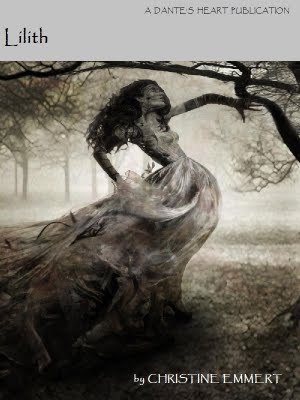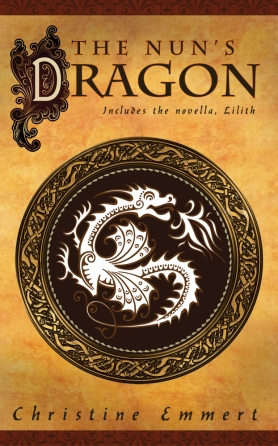Maleficent: An Afterword
by Stant Litore
The greatest monsters—and the most beautiful angels—are those within us. Christine Emmert understands this, and she reminds us of it with wonder and terror. —No, “reminds us” is such a calm, rational way of putting it. That is not what Emmert’s stories do. Her tales are neither calm nor rational. They fall upon us with a shock, the way her wyvern in The Nun’s Dragon tears a hole in the sky and drops from the stars to earth, or the way Lilith dives shrieking from the dark air, talons extended, to clutch up baby mice or baby people. Emmert doesn’t remind us of anything. She compels us not to forget, compels us to look around at our world and at each other with wide-opened eyes.
 The narrator of Lilith
tells us of her marriage to her husband: “Our own wedding vows baffled
him when I asked to be shackled to his naked beating heart in the anger
of winter.” To read a Christine Emmert story is to receive a
communication that is a little bit like that vow. Her fiction is wind
and dark wine; she draws us into scenes that are as finely and precisely
crafted as gardens, scenes that seem as carefully static and controlled
as gardens, or as medieval paintings. But then she stands behind us,
whispering the incantation of her story in our ear as we look on, and
suddenly thorns and briars tear their way through soil or canvas and
rear up dark all around us, as though she is Maleficent. Then we move
forward into the darker and more beautiful heart of the story—a story
we’d thought for a moment was just a pretty garden!—and the thorns cut
us as we go in, and we bleed.
The narrator of Lilith
tells us of her marriage to her husband: “Our own wedding vows baffled
him when I asked to be shackled to his naked beating heart in the anger
of winter.” To read a Christine Emmert story is to receive a
communication that is a little bit like that vow. Her fiction is wind
and dark wine; she draws us into scenes that are as finely and precisely
crafted as gardens, scenes that seem as carefully static and controlled
as gardens, or as medieval paintings. But then she stands behind us,
whispering the incantation of her story in our ear as we look on, and
suddenly thorns and briars tear their way through soil or canvas and
rear up dark all around us, as though she is Maleficent. Then we move
forward into the darker and more beautiful heart of the story—a story
we’d thought for a moment was just a pretty garden!—and the thorns cut
us as we go in, and we bleed.Her prose is beautiful, but it is not for everyone. There is an archaism to it that can prove either seductive or off-putting—as though Emmert is standing at the very brink of language, with a chasm of howling dark behind her, and before her the plateau of our modern language and our modern thinking, with its convenient sentences and figures of speech and comfortable ways of saying and hearing comfortable and familiar things—as though these comforts are a stand of poplars shielding our plateau from reality’s wind. She comes against our poplars with blades fashioned from images and from fragments she has taken from ancient ways of speaking, ways that we can no longer use but whose edges still cut. Then, the poplars down, she lets in the wind. She lets in the cold.
With our hair and our garments streaming behind us, we look out at a landscape transformed by the storm, by the sudden onset: nothing is as it was. Nothing is as we expect. We stride through the remains of our poplars, our familiarities, and in doing this we meet our world again as if for the first time, raw and rough with all of its potential—all of its horror and all of its wonder—laid bare. No comfortable refuge to protect us, no walls mortared with the hard bricks of our expectations.
 We
might meet anyone in this wind, among these fallen trees: maiden or
dragon or dark shadow. And they will not be who we expect, and we, the
readers, will not be who we’ve thought we are. We might glance up and
see stars again, stars bright and burning, stars we have forgotten. Or
we might glance down and see blood we have spilled, blood we have
forgotten. But in either case, we will not be permitted to just stroll
quietly, blindly, in the shade of our poplars.
We
might meet anyone in this wind, among these fallen trees: maiden or
dragon or dark shadow. And they will not be who we expect, and we, the
readers, will not be who we’ve thought we are. We might glance up and
see stars again, stars bright and burning, stars we have forgotten. Or
we might glance down and see blood we have spilled, blood we have
forgotten. But in either case, we will not be permitted to just stroll
quietly, blindly, in the shade of our poplars.When you first step up to the medieval painting that a Christine Emmert story appears at first to be, you might think you are strolling in the shade of poplars. But you are not. Because the moment you are in, those poplars will be torn aside, and you will be in the thorn thicket. Emmert is Maleficent, not William Wordsworth. But, turning one page to the next, you must ask: what unsuspected beauty sleeps behind these thorns, waiting for you—you who are sleeping—to wake?
Stant Litore
January 13, 2014




2 comments:
great post.. greeting from indonesia :)
Thankk you
Post a Comment